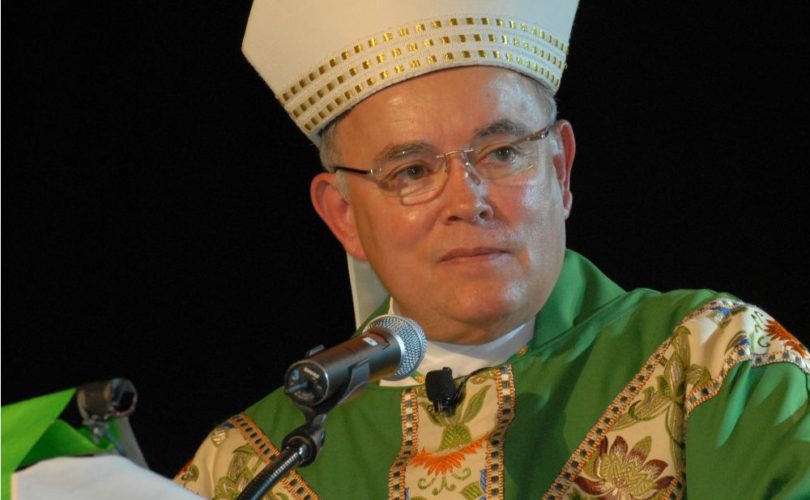October 20, 2016 (LifeSiteNews) – American Catholics must rediscover their distinct identity and separate themselves from a culture increasingly at odds with the faith, Philadelphia Archbishop Charles J. Chaput said in a monumental speech at the University of Notre Dame.
In his lecture, delivered at Notre Dame’s 2016 Bishops’ Symposium, Chaput outlined how many Americans Catholics became willing to disconnect their “private” faith from their “public” lives and what the Church should do about this.
“We need to recover our identity as a believing community,” he said.
“During his years as bishop of Rome, Benedict XVI had the talent of being very frank about naming sin and calling people back to fidelity,” said Chaput. “Yet at the same time he modeled that fidelity with a kind of personal warmth that revealed its beauty and disarmed the people who heard him. He spoke several times about the ‘silent apostasy’ of so many Catholic laypeople today and even many priests; and his words have stayed with me over the years because he said them in a spirit of compassion and love, not rebuke.”
This silent apostasy doesn’t mean Catholics need to “publicly renounce their baptism”–it just means “they simply need to be silent when their Catholic faith demands that they speak out; to be cowards when Jesus asks them to have courage; to ‘stand away’ from the truth when they need to work for it and fight for it,” Chaput explained.
Politicians like John F. Kennedy who promised to keep his Catholic faith separate from his leadership as President and those who claim to be “personally” but not publicly pro-life have led the way for this silent apostasy, Chaput argued.
“Quite a few of us American Catholics have worked our way into a leadership class that the rest of the country both envies and resents,” he explained. “And the price of our entry has been the transfer of our real loyalties and convictions from the old Church of our baptism to the new ‘Church’ of our ambitions and appetites. People like Nancy Pelosi, Anthony Kennedy, Joe Biden and Tim Kaine are not anomalies. They’re part of a very large crowd that cuts across all professions and both major political parties.”
Additionally, Chaput said, as society has become more focused on technology, it has found less of a use for religion.
“In effect, technology and its comforts are now our substitute horizon for the supernatural,” he said. “Technology gets results. Prayer, not so much—or at least not so immediately and obviously. So our imaginations gradually bend toward the horizontal, and away from the vertical.”
“Religion can still have value in this new dispensation by helping credulous people do socially useful things,” Chaput continued. “But religion isn’t ‘real’ in the same way that science and technology are real…The Church of our baptism is salvific. The Church where many Americans really worship, the Church we call our popular culture, is therapeutic.”
Chaput blasted “the hollowing out and retooling of all the key words in our country’s public lexicon; words like democracy, representative government, freedom, justice, due process, religious liberty and constitutional protections.” He said that words like equality and freedom mean one thing to practicing Catholics but a very different thing to the leaders of modern society.
Christian freedom, Chaput said, “is the liberty, the knowledge and the character to do what’s morally right” and the definition of equality is “much more robust than the moral equivalent of a math equation.”
The future of the Catholic Church in America may not boast booming numbers, Chaput warned. But, he said, “we should never be afraid of a smaller, lighter Church if her members are also more faithful, more zealous, more missionary and more committed to holiness…Losing people who are members of the Church in name only is an imaginary loss. It may in fact be more honest for those who leave and healthier for those who stay. We should be focused on commitment, not numbers or institutional throw-weight.”
Chaput said that he appreciates the witness of Philadelphia Muslim women who wear the hijab to distinguish themselves as not participating in an overly sexualized culture. Catholics need to make themselves more distinct from the rest of secular society, he said.
“We need to help Catholics recover their own sense of distinction from the surrounding secular meltdown,” he said. “The Church and American democracy are very different kinds of societies with very different structures and goals. They can never be fully integrated without eviscerating the Christian faith. An appropriate ‘separateness’ for Catholics is already there in the New Testament. We’ve too often ignored it because Western civilization has such deep Christian roots. But we need to reclaim it, starting now.”
Read Chaput’s whole speech here.

